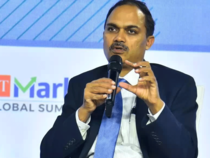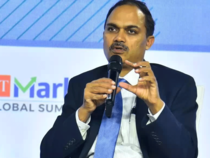

Mouthwatering valuations amid hopes of subdued consumer demand due to falling income and job losses have put equity investors in a fix on Dalal Street.
Ace stock picker Prashant Jain says consumption has been the main casualty of the lockdown. Yet, he said the market is looking attractive in terms of market cap-to-GDP, which is currently hovering at 60 per cent.
“Whenever you have invested in India at these levels, the market has delivered healthy returns over the next 3-5 years,” he said at an investors’ call over the weekend.
The BSE500 index is down 25 per cent on a year-to-date basis with nearly 80 per cent of stocks trading below their five-year average prices.
What should investors do?
There is a deep pessimism about equities right now, but at the same time there is a good value in strong businesses. “Investing is about right understanding and it needs a lot of patience,” Jain said.
The Executive Director and Chief Investment Officer (CIO) of HDFC Mutual Fund advised investors not to look at price-to-earnings (P/E) multiples this year. “The ongoing shutdown has already hit the profitability of India Inc. This may lead to wrong judgement in terms of stock selection,” he said.
“Instead, investors should focus on the financials of FY22 in a sector by sector approach. The ongoing financial year is an outlier year for India Inc, and this year’s figures are not representative of the future,” he said.
Lower interest rate means higher corporate profit and lower EMIs. It can increase affordability. “However, India is facing a demand challenge right now. Whenever the worst for profit is behind us, it will be good for higher multiples,” he said, adding that headlines will start changing soon.
Where to invest?
Jain said India needs low interest rates and low crude oil prices. Both of these elements are there with good investment opportunities in the market.
“The cycle has been broken because of the lockdown. It will take some time to revive. This year is an outlier and long-term investors, it is best to ignore this year,” he said.
The money manager, who manages Rs 3.45 lakh crore wealth at India’s second largest fund house, said he prefers large banks right now, as their exposure to unsecured retail loans and SME loans is limited. They should gain market share from non-banking finance companies. “Large banks are sustainable. They will remain profitable,” he said.
Jain said he also likes utilities, telecom, PSU oil and gas companies, cement, IT and pharma players.
The BSE Telecom and Healthcare indices have advanced over 20 per cent and 15 per cent, respectively, on a year-to-date basis, while the BSE PSU and IT indices have declined 39 per cent and 11 per cent, respectively, in the same period.
On telecom, Jain said pricing is improving in the sector and it is close to fair value, which means returns are in line with growth. HDFC Mutual Fund held over 1.50 crore shares in Bharti Airtel as of April 30.
He said refining margins for PSU oil and gas companies will improve once oil consumption normalises. These companies are trading below their book values.
“Marketing margin has gone up sharply and Mideast producers are offering a reasonable discount to refiners,” Jain said.
PSU majors including Indian Oil Corporation, BPCL, HPCLNSE 3.60 %, Oil India and ONGCNSE 1.23 % were among the top holdings of the fund house from the oil and gas sector at the end of April. “Select PSUs have a strong businesses with solid fundamental. They will catch up,” said Jain.
He, however, said auto, white goods, brown goods, hotels, airlines and luxury goods companies, garments and shoes may remain under pressure.
Valuations of the FMCG pack do not make any sense for investing. “This sector may be hit further due to a fall in income,” Jain said.
HDFC Mutual Fund sold over between 3-8 lakh shares of ITC, Colgate-PalmoliveNSE 0.02 % and Bajaj Consumer Care last month, data from Ace Mutual Fund showed.
The automobile sector, which is grappling with the a slowing economy, may continue to remain under pressure, as there are chances that customers who have availed moratoriums may not get loans, he said adding that almost three-fourth of sales are driven by loans. This will impact the sector badly.
source: economictimes
